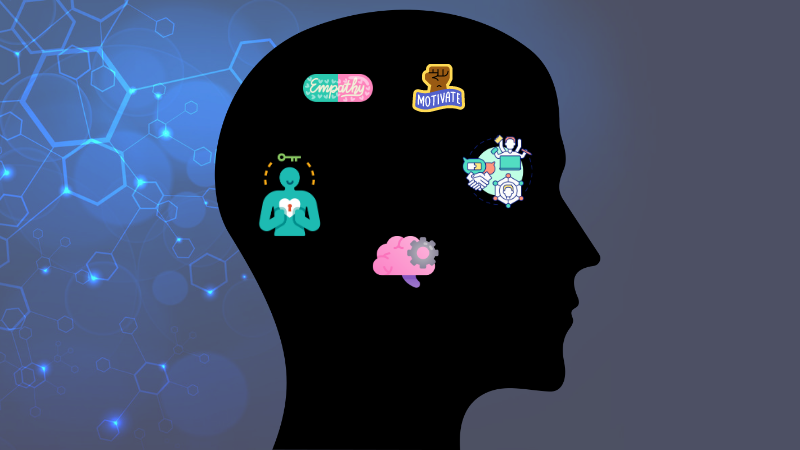Why Teaching Emotional Intelligence is Crucial for Students
Why Teaching Emotional Intelligence is Crucial for Students. Emotional intelligence (EI) is a critical skill set that is often overlooked in traditional education systems. However, as we continue to navigate the complexities of modern society, it is becoming increasingly clear that teaching emotional intelligence is crucial for students. In this article, we will explore why emotional intelligence is so important for students, and how educators can teach and promote these skills in the classroom. By providing students with the tools and knowledge they need to manage their emotions, build relationships, and make responsible decisions, we can help them lead successful and fulfilling lives both in and out of school.
1. The Importance of Emotional Intelligence in Today’s World
Emotional intelligence (EI) refers to the ability to understand, manage, and express one’s own emotions, as well as the emotions of others. In today’s world, EI is becoming increasingly important, as it helps individuals navigate complex social interactions and relationships.
One of the key benefits of emotional intelligence is its role in fostering positive relationships. Individuals with high EI are better able to understand the emotions of others, empathize with their feelings, and respond appropriately. This can lead to more harmonious personal and professional relationships, as well as greater overall satisfaction in life.
In addition, emotional intelligence can help individuals manage stress and anxiety. Those with high EI are better equipped to recognize and regulate their own emotions, which can prevent negative emotions from spiraling out of control. This can also improve mental health outcomes, as individuals with high EI may be more resilient in the face of adversity.
EI is also becoming increasingly important in the workplace. Employers are looking for individuals who can work effectively in teams, communicate clearly, and manage conflicts in a constructive manner. These are all skills that are closely tied to emotional intelligence.
Despite its importance, emotional intelligence is not always taught in schools or explicitly valued in the workplace. However, individuals can work to develop their EI through self-reflection, practicing active listening, and seeking feedback from others.
2. Key Elements of Emotional Intelligence and Their Impact on Student Success
Emotional intelligence (EI) is composed of several key elements that can have a significant impact on student success. These elements include self-awareness, self-regulation, motivation, empathy, and social skills.
Self-awareness refers to the ability to recognize and understand one’s own emotions, thoughts, and behaviors. Students who possess high levels of self-awareness are better able to identify their strengths and weaknesses, set realistic goals, and manage their own emotions effectively. This can lead to greater self-confidence, improved decision-making skills, and increased resilience in the face of challenges.
Self-regulation involves the ability to manage one’s own emotions and behaviors in a productive manner. Students with strong self-regulation skills are better able to control their impulses, stay focused on their goals, and manage stress and anxiety effectively. This can lead to improved academic performance, better relationships with peers and teachers, and increased overall well-being.
Motivation refers to the drive to achieve one’s goals and pursue success. Students who are highly motivated tend to set ambitious goals for themselves, work hard to achieve them, and persist in the face of obstacles. This can lead to improved academic performance, increased engagement in extracurricular activities, and greater success in life beyond school.
Empathy refers to the ability to understand and respond to the emotions of others. Students who are highly empathetic tend to have stronger relationships with their peers and teachers, and are better able to resolve conflicts in a constructive manner. This can lead to greater social support, increased feelings of belonging, and improved overall well-being.
Social skills involve the ability to communicate effectively, collaborate with others, and build positive relationships. Students who possess strong social skills tend to be more successful in group projects, are more likely to seek out leadership positions, and are better prepared for success in the workplace. This can lead to improved academic and career outcomes.
3. Strategies for Teaching Emotional Intelligence in the Classroom
Teaching emotional intelligence (EI) in the classroom is important for helping students develop the social and emotional skills needed to succeed in school and in life. Here are some strategies for teaching EI in the classroom:
- Model EI: Teachers should model emotional intelligence by demonstrating self-awareness, self-regulation, empathy, and social skills in their interactions with students. This can help students learn by example and see how EI can be applied in real-world situations.
- Teach vocabulary: Students may not be familiar with the language of emotions, so it is important to teach them a vocabulary that helps them identify and express their emotions. This includes teaching them different emotion words and how to use them in context.
- Practice mindfulness: Mindfulness practices, such as deep breathing, meditation, and visualization, can help students develop self-awareness and self-regulation skills. Teachers can incorporate mindfulness practices into the classroom routine, such as starting the day with a breathing exercise or taking a moment to pause and reflect before beginning an activity.
- Encourage reflection: Reflection activities, such as journaling or group discussions, can help students develop self-awareness and self-reflection skills. Teachers can encourage students to reflect on their emotions, actions, and the impact of their behavior on others.
- Role-play and social scenarios: Role-playing activities and social scenarios can help students practice empathy and social skills. Teachers can create scenarios that challenge students to identify emotions, practice active listening, and communicate effectively.
- Offer feedback: Feedback is important for helping students develop their emotional intelligence skills. Teachers can provide feedback on how students express emotions, manage stress, and communicate with others.
- Create a positive classroom environment: A positive classroom environment can promote emotional intelligence by creating a sense of safety and belonging. Teachers can create a positive classroom environment by fostering positive relationships with students, setting clear expectations, and promoting a culture of respect and empathy.
4. Building Emotional Resilience: Helping Students Manage Stress and Anxiety
Building emotional resilience is an important skill for students to learn in order to manage stress and anxiety. Here are some strategies for helping students build emotional resilience:
- Teach coping skills: Teach students specific coping skills they can use when they feel stressed or anxious. This could include deep breathing, mindfulness techniques, or physical exercise.
- Encourage self-care: Encourage students to take care of themselves by getting enough sleep, eating well, and taking breaks when needed. Encourage students to engage in activities they enjoy and that help them relax.
- Promote a growth mindset: Encourage students to view challenges as opportunities for growth and learning. Help them reframe negative self-talk and encourage them to focus on their strengths and abilities.
- Foster social connections: Social support can help students build emotional resilience. Encourage students to connect with their peers, participate in group activities, and seek support from trusted adults.
- Create a safe and supportive environment: Create a safe and supportive environment in the classroom by promoting a culture of respect, empathy, and inclusion. Encourage open communication and provide opportunities for students to express their emotions and concerns.
- Provide opportunities for success: Provide students with opportunities for success by setting achievable goals and providing feedback and support. Celebrate their successes and help them learn from their failures.
- Encourage help-seeking behavior: Encourage students to seek help when they need it. Let them know that it is okay to ask for help and provide them with resources, such as counseling services or mental health support.
5. The Future of Education: How Emotional Intelligence Will Shape Learning and Work.
The future of education is rapidly evolving, and emotional intelligence (EI) is becoming an increasingly important factor in shaping learning and work. Here are some ways in which EI will shape the future of education:
- Emphasis on social and emotional learning: There will be a greater emphasis on social and emotional learning (SEL) in schools, as educators recognize the importance of teaching students how to manage their emotions, build relationships, and make responsible decisions. This will involve teaching students specific EI skills, such as self-awareness, self-regulation, empathy, and social skills.
- Integration of technology: Technology will play a significant role in shaping the future of education, and EI will be integrated into technology-based learning platforms. This will involve using digital tools to teach EI skills and provide students with real-time feedback and support.
- Increased focus on mental health: There will be an increased focus on mental health in schools, as educators recognize the importance of supporting students’ emotional well-being. This will involve providing students with resources and support for managing stress, anxiety, and other mental health issues.
- Preparation for the workplace: EI will be a critical factor in preparing students for the workplace, as employers increasingly value employees who have strong emotional intelligence skills. This will involve teaching students how to communicate effectively, manage their emotions, and build relationships with colleagues and clients.
- Development of emotional intelligence assessments: There will be an increased focus on measuring and assessing emotional intelligence, as educators and employers recognize the importance of these skills. This will involve the development of new assessments and tools for measuring EI, which can be used to guide instruction and provide feedback to students.
In conclusion, emotional intelligence is a crucial skill set for students to learn and develop, as it not only shapes their academic success but also prepares them for future success in the workplace and in life. With the rapid evolution of education, it is important for educators to emphasize social and emotional learning, integrate technology, focus on mental health, and develop new assessments for measuring EI. By doing so, educators can ensure that students are well-equipped to manage their emotions, build relationships, and make responsible decisions, leading to a more successful and fulfilling future.







